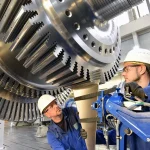Course Overview:
This course focuses on the fundamental principles of occupational safety and its applications within mechanical engineering. It covers best practices and advanced techniques for ensuring a safe work environment in factories and mechanical workshops, highlighting methods for accident prevention and risk identification. This course is essential for engineers and technicians seeking to strengthen their knowledge of safety protocols.
Course Objectives:
- Understand core occupational safety standards in mechanical engineering.
- Learn risk mitigation techniques and methods to avoid workplace accidents.
- Apply appropriate safety procedures in mechanical work environments.
- Increase awareness of common hazards and develop effective prevention strategies.
Course Content:
- Introduction to Occupational Safety: Importance of safety in mechanical engineering and its role in improving the work environment.
- Hazard Identification: Types of risks in the mechanical field, such as machinery hazards, exposure to chemicals, and electrical risks.
- Basic Safety Procedures: Preventive measures to avoid accidents and comply with safety standards.
- Risk Control: Strategies for managing and reducing risk impacts.
- Personal Protective Equipment Training: Proper use of personal protective equipment.
- Accident Prevention: Techniques for handling incidents and first aid procedures.
- Safety Evaluation and Continuous Improvement: Methods for assessing the effectiveness of safety plans and developing continuous improvement.
Target Audience: This course is designed for mechanical engineers, technicians, safety managers, supervisors in factories and mechanical projects, and mechanical engineering students. It is also suitable for anyone in the mechanical field who wants to enhance their knowledge of occupational safety practices and protocols.






